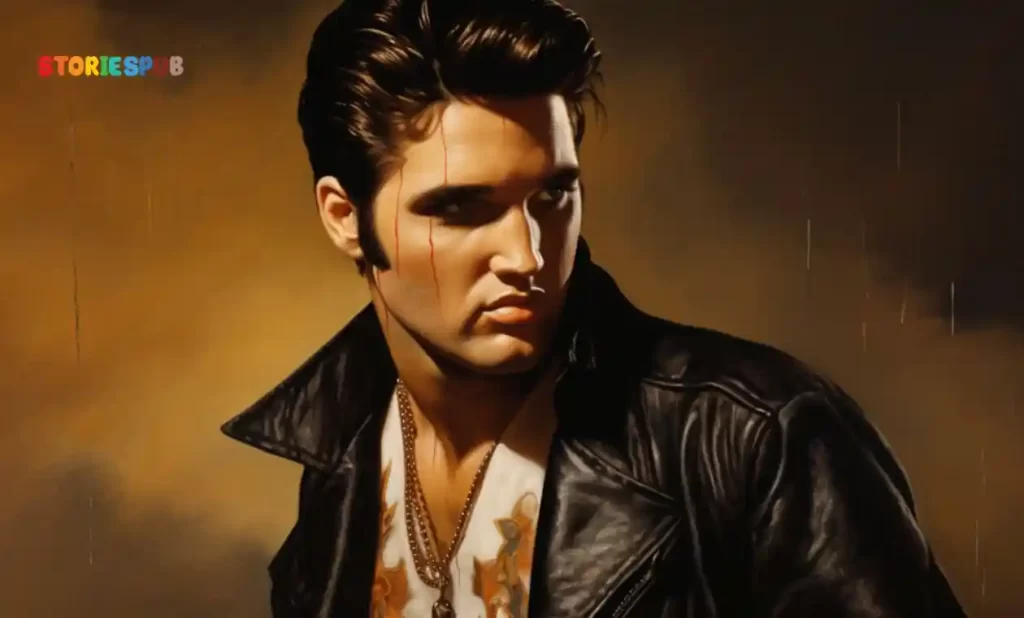Summarize this Article with:

Elvis Presley, a name synonymous with the rhythmic heartbeat of an era, emerged as more than just a musician; he became the embodiment of a musical revolution. As the King of Rock and Roll, his electrifying performances and soul-stirring melodies have left an indelible mark on both the music industry and the fabric of pop culture. With his hip-swiveling dance moves and a voice that resonated with raw emotion, Elvis transformed a simple melody into an electrifying experience that captivated hearts worldwide.
His seismic influence transcended generations, carving a path through the hearts of millions. From the raw energy of “Heartbreak Hotel” to the tender crooning of “Can’t Help Falling in Love,” each note he sang was a testament to his ability to blend various genres and emotions into a harmonious symphony.
This biography delves into the life of Elvis Presley, exploring the roots of his passion, the meteoric rise that propelled him to stardom, and the lasting legacy that continues to resonate today. Journey with us as we unravel the man behind the music, the legend behind the name, and the enduring spirit that remains the heartbeat of rock and roll.
Personal and Professional Details
| Category | Details |
| Full Name | Elvis Aaron Presley |
| Birth Date | 08-Jan-35 |
| Birth Place | Tupelo, Mississippi, United States |
| Death Date | 16-Aug-77 |
| Death Place | Memphis, Tennessee, United States |
| Nationality | American |
| Profession | Singer, Musician, Actor |
| Genre | Rock and Roll, Pop, Rockabilly |
| Instruments | Vocals, Guitar, Piano |
| Label | Sun Records, RCA Records |
| Notable Hits | “Heartbreak Hotel,” “Can’t Help Falling in Love,” “Jailhouse Rock” |
| Film Debut | “Love Me Tender” (1956) |
| Films | “Jailhouse Rock,” “Blue Hawaii,” “Viva Las Vegas” and more |
| Awards | Grammy Awards, Lifetime Achievement Award, Rock and Roll Hall of Fame |
| Marital Status | Married to Priscilla Presley (1967-1973) |
| Children | Lisa Marie Presley (daughter) |
| Legacy | Cultural Icon, The King of Rock and Roll, One of the Best-Selling Music Artists of All Time |
Early Years and Musical Roots
Elvis Presley’s journey began in the humble town of Tupelo, Mississippi. Born on January 8, 1935, to Gladys and Vernon Presley, he grew up in a modest home that would later stand as a symbol of his unbreakable connection to his roots. It was within the vibrant atmosphere of the Deep South that he was first exposed to the rich tapestry of musical genres that would shape his iconic style.
Tupelo’s vibrant cultural scene offered young Elvis a playground of influences. Gospel music, with its soaring harmonies and emotive lyrics, struck a chord deep within him. The soulful sounds of blues melodies and the twang of country tunes also found their way into his heart. These diverse influences would later converge to create his distinctive sound.
Elvis’s first tryst with music was at the Assembly of God church, where gospel music took center stage. He would listen intently, captivated by the emotional resonance of the performances. It was during these formative years that he absorbed the power of music as a means of expression and connection.
The Presley family’s move to Memphis, Tennessee, would prove pivotal for Elvis’s musical journey. Memphis, known for its thriving music scene, provided the perfect backdrop for the budding artist to hone his craft. The vibrant sounds of Beale Street and the blues-infused melodies that echoed through the city’s airwaves continued to shape his musical aspirations.
Elvis’s unique ability to fuse gospel, blues, and country into a single, electrifying style began to emerge during these early years. His innate talent, coupled with his boundless passion for music, paved the way for a journey that would change the landscape of popular culture forever. The seeds of innovation were sown, setting the stage for Elvis to become the King of Rock and Roll, a title he would wear with pride and honor.
Rise to Stardom and Cultural Impact
Elvis Presley’s meteoric rise from a budding artist to a global sensation was nothing short of extraordinary. His journey to stardom began in the mid-1950s when he signed with Sun Records, a pivotal moment that marked the beginning of a musical revolution. His fusion of rockabilly, rhythm and blues, and country elements created a sound that resonated with a diverse audience.
The young musician’s charisma and captivating stage presence set him apart. With his smoldering good looks, slicked-back hair, and undeniable charm, Elvis commanded attention the moment he stepped onto the stage. His signature moves, including his iconic hip-shaking dance style, created a frenzy among his fans and sparked controversy among more conservative audiences.
Elvis’s groundbreaking appearances on television, including his historic performance on “The Ed Sullivan Show,” solidified his status as a cultural phenomenon. His rebellious image and electrifying performances captured the spirit of a generation that was yearning for something new and exciting. His music and style not only shook up the music industry but also ignited a cultural revolution that transcended the boundaries of race and class.
The impact of Elvis’s music extended beyond the airwaves and concert halls. His influence on fashion, hairstyles, and attitudes was undeniable. The youth of the era saw him as a symbol of rebellion, a representative of their desire for change and self-expression. Elvis’s music served as a soundtrack to the evolving social landscape of the time, bridging gaps and challenging conventions.
Elvis Presley’s rise to stardom was a seismic shift in the music and entertainment landscape. His charismatic presence and innovative approach to music left an indelible mark on popular culture. The King of Rock and Roll had not only conquered the charts but also hearts and minds, forever cementing his legacy as a true pioneer and a cultural icon.
Musical Evolution and Iconic Hits
Elvis Presley’s musical journey was a testament to his versatility and willingness to push artistic boundaries. As his career evolved, so did his musical style, allowing him to explore a range of genres and create a body of work that resonated with audiences across generations.
In the early years of his career, Elvis’s music was characterized by its fusion of rockabilly, country, and rhythm and blues. Tracks like “Heartbreak Hotel” and “Hound Dog” became instant classics, setting the stage for his rise to fame. His energetic and electrifying performances showcased a unique voice that could seamlessly traverse genres, leaving an indelible mark on the music landscape.
As the 1960s rolled in, Elvis’s sound continued to evolve. He effortlessly transitioned from rock and roll to softer ballads, showcasing a depth and maturity in his artistry. Hits like “Can’t Help Falling in Love” and “Love Me Tender” showcased his emotive vocal range and his ability to convey raw emotion through his music.
Elvis’s foray into film also influenced his musical direction. The success of his movies led to a series of soundtrack albums that featured a mix of genres, from rock and pop to gospel and soul. This diversity allowed him to capture a wider audience, solidifying his status as a musical powerhouse.
One of the hallmarks of Elvis’s career was his ability to embrace change and adapt to evolving musical trends. In the late 1960s, he staged a triumphant comeback with the legendary NBC television special, where he showcased a more contemporary sound. His performances of songs like “Suspicious Minds” displayed a newfound maturity and a willingness to experiment with different styles.
Elvis’s legacy is woven into the fabric of popular music, and his hits remain timeless and universally beloved. His songs have transcended eras, continuing to inspire artists and captivate audiences today. The King’s ability to seamlessly blend genres and evolve his sound while staying true to his unique voice solidified his position as one of the greatest musical innovators of all time.
Silver Screen Success and Influence
Elvis Presley’s journey to stardom didn’t just take place on the concert stage; it also unfolded on the silver screen. His foray into acting marked a significant chapter in his career, showcasing his versatility as an entertainer and leaving an indelible mark on the film industry.
In the late 1950s, while riding the wave of his musical triumphs, Elvis’s charismatic persona made its way to the cinema. His debut film, “Love Me Tender,” served as an introduction to his acting prowess and quickly ignited a fervor among his fans. The transition from live performances to the cinematic world was seamless, thanks to his natural charisma and magnetic presence.
Throughout the 1960s, Elvis starred in a series of films that became synonymous with entertainment for a generation. These movies, often featuring catchy tunes, lively dance sequences, and light-hearted narratives, solidified his position as a cultural icon. Films like “Jailhouse Rock,” “Blue Hawaii,” and “Viva Las Vegas” not only showcased his musical talents but also demonstrated his ability to captivate audiences with his acting skills.
Elvis’s films were not just successful at the box office; they left an enduring impact on the film industry itself. His unique blend of music and acting contributed to the rise of musical films and established a blueprint for future musician-turned-actor endeavors. Beyond their entertainment value, his films played a role in shaping youth culture and reflected the spirit of the era.
The influence of Elvis Presley as a musician was seamlessly interwoven with his impact as an actor. His cinematic presence enhanced his musical legacy, and his films allowed fans to experience his charm and talent in a new dimension. Elvis’s silver screen success solidified his status as a multimedia phenomenon, demonstrating his ability to captivate hearts not only through music but also on the big screen.
Personal Life and Charisma
Behind the electrifying performances and iconic image, Elvis Presley’s personal life offered a glimpse into the man beyond the stage. Born into a close-knit family in Tupelo, Mississippi, his strong bond with his parents, Gladys and Vernon Presley, laid the foundation for his values and character.
Elvis’s rise to stardom didn’t diminish his connections with his roots. His love for his family and his hometown remained unwavering, reflecting a sense of humility that endeared him to his fans. However, his charisma and enigmatic persona went beyond his familial ties. He possessed an innate ability to captivate an audience, whether in a sold-out stadium or a quiet moment of interaction.
Elvis’s charm wasn’t limited to his musical performances; it extended to his interactions with people from all walks of life. His genuine kindness and approachability left an indelible mark on those who had the privilege of meeting him. His ability to connect with people, regardless of their background, contributed to his enduring popularity and the formation of an intensely loyal fan base.
Beyond his music and charisma, Elvis’s impact on society extended to his philanthropic efforts. He often used his fame and resources to contribute to various charitable causes, reflecting his desire to make a positive difference in the world. His contributions to organizations focused on children’s welfare, healthcare, and disaster relief showcased his commitment to giving back.
Elvis Presley’s personal life and charisma were intertwined with his legacy as an entertainer and an individual. His enigmatic personality, genuine kindness, and dedication to philanthropy added layers to the image of the King of Rock and Roll. Through his actions, both on and off the stage, he continued to inspire generations with his impact on society and his genuine connection with people.
Cultural Icon and Legacy
Elvis Presley’s impact on popular culture transcended music, earning him an eternal status as a cultural icon. With his distinctive style and unmatched charisma, he left an indelible mark that continues to resonate across generations.
Elvis’s influence extended beyond his music, infiltrating fashion, style, and trends. His unique fashion choices, including the famous jumpsuits, leather ensembles, and slick hairstyles, became synonymous with his image. He effortlessly blended different styles, creating a signature look that inspired countless imitators and set new standards for coolness.
However, his cultural significance went deeper than his appearance. Elvis revolutionized the entertainment industry, bridging the gap between different genres and cultures. His performances challenged social norms and conventions, captivating audiences of all backgrounds. He became a unifying force, appealing to a diverse range of fans and breaking down barriers through the universal language of music.
Elvis’s legacy in music and entertainment is undeniable. His records, including numerous chart-topping hits, continue to be celebrated milestones. His influence is echoed in the works of countless artists who followed in his footsteps, shaping the trajectory of rock and roll and beyond. His dynamic stage presence, innovative performances, and memorable collaborations set benchmarks that aspiring musicians strive to emulate.
Beyond his artistic contributions, Elvis’s legacy extends to his philanthropic endeavors. His impact on society is visible through the Elvis Presley Charitable Foundation, established to carry forward his charitable work. The foundation’s initiatives continue to make a difference in areas such as education and health.
Elvis Presley’s enduring legacy as a cultural icon remains an inspiration to aspiring artists and a source of nostalgia for those who witnessed his glory days. His imprint on fashion, music, and society at large showcases his unparalleled ability to shape and define an era. His influence continues to resonate in the hearts of fans and reverberate through the fabric of popular culture.
Myths and Misconceptions
The legacy of Elvis Presley is not without its share of myths and misconceptions that have grown over time, often blurring the lines between fact and fiction. While he remains an iconic figure, it’s important to delve into these myths to separate reality from the legends.
One of the most persistent myths surrounding Elvis is the idea that he died due to a lifestyle of excess. While it’s true that his health deteriorated in his later years, the actual cause of his death was a heart attack. Misleading narratives about drug abuse have led to a skewed perception of his final days.
Elvis’s portrayal in popular culture has sometimes veered into caricature, perpetuating misconceptions about his personality and behavior. Fictionalized portrayals in movies and television shows have added layers of complexity to his image, making it challenging to discern between the man and the myth.
Efforts have been made to demystify Elvis’s life and present a more accurate picture. Biographies, documentaries, and accounts from those who knew him shed light on his genuine nature, his dedication to his craft, and his struggles with fame. These endeavors aim to provide a more holistic understanding of the man behind the legend.
In the digital age, misinformation can spread rapidly, perpetuating myths even further. However, fans and historians continue to strive for accuracy, debunking myths and ensuring that the truth about Elvis’s life and legacy is preserved for future generations. By untangling the web of myths, we gain a deeper appreciation for the real person whose impact on music and culture remains unparalleled.
Conclusion
Elvis Presley’s remarkable journey from the modest streets of Tupelo to becoming the undisputed King of Rock and Roll has left an indelible mark on the world. With a unique blend of musical talent, charismatic presence, and pioneering spirit, Elvis transformed the music industry and ignited a cultural revolution that continues to reverberate through the ages.
His fusion of genres, from gospel to rock, laid the foundation for a new era in music. The iconic hip-shaking moves and electrifying stage presence made him a global sensation, transcending boundaries and connecting with people on a profound level. Beyond the music, Elvis’s influence extended to fashion, style, and attitudes, shaping the very fabric of popular culture.
As we reflect on his legacy, it’s clear that Elvis Presley’s impact is far from fading. His songs still resonate, his movies still entertain, and his name remains synonymous with the spirit of rebellion and innovation. By celebrating his contributions, we honor the enduring legacy of the King of Rock and Roll—a legacy that reminds us to embrace our passions, challenge conventions, and leave an unforgettable mark on the world, just as he did.
Elvis Presley FAQs
What is Elvis Presley known for?
Elvis Presley is known for being the King of Rock and Roll, pioneering the rock music genre, and his dynamic stage presence.
How did Elvis Presley die?
Elvis Presley died on August 16, 1977, at the age of 42, due to a heart attack.
How many songs did Elvis Presley record?
Elvis Presley recorded over 600 songs during his career, spanning various genres like rock, gospel, and ballads.
What was Elvis Presley's first song?
Elvis's first single was "That's All Right," released in 1954, which marked his entry into the music scene.
How many movies did Elvis Presley star in?
Elvis Presley starred in 33 movies, with some of the notable ones being "Jailhouse Rock" and "Blue Hawaii."















